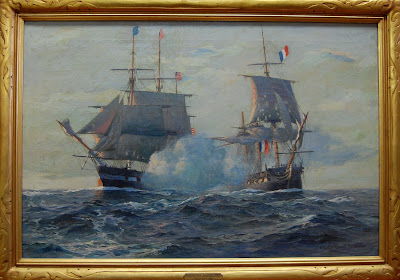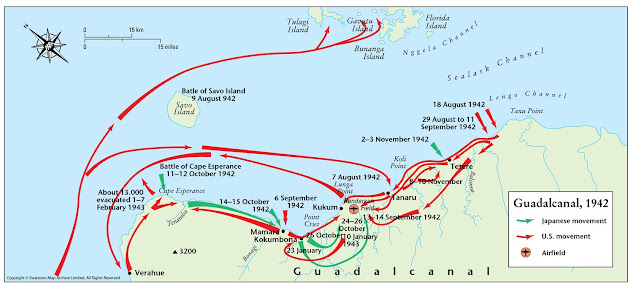Celebrating in Time of War
Before World War II, the United States military tried its best to make the holiday season a festive time for the uniformed services. Special dinners, concerts, competitions, and religious services all featured in the December activities advertised in base newspapers throughout the 1920s and 30s. At Naval Training Station Newport, service personnel were granted leave to travel home if they lived in the area, a privilege made possible by the relaxed training schedule of a nation at peace. Those who had to remain on base would often write letters or postcards to let their families know they were thinking of them.
 |
| U.S. Naval War College Christmas postcard, 1929 click image to enlarge |
All of that changed after the attack on Pearl Harbor. For some, the holiday season that followed just weeks later was a grim one indeed. One can imagine how difficult it must have been to rouse the usual holiday cheer in the wake of a national tragedy, and with so many Americans facing the prospect of overseas deployment and combat. Indeed, no holiday season was ever really normal during the war. With millions of people away from home and even more hard at work on the home front supporting the war effort, it must have been difficult to feel happy or hopeful about the future. The anniversary of Pearl Harbor occurred each year at the start of the holidays, and the memory of those attacks surely must have inspired fresh feelings of anger and sadness. Outrage over the way the war started never completely faded away, though in following years public sentiment grew to encompass a steady resolve and determination to see things through to the end.
 |
| Newport Recruit and Service Schools Log, December 18, 1943 |
| click image to enlarge |
Naval Training Station Newport resumed publishing the base newspaper called Newport Recruit and Service Schools Log in January 1943. It was normally printed every Saturday, but since Christmas fell on a Saturday in 1943, that week's issue came out on Christmas Eve instead. The paper contained a full listing of special events for that week to include Christmas caroling, variety shows, and multiple viewings of A Christmas Carol in the drill hall. Religious programs included special services on Christmas Eve and Christmas Day for Catholics and Protestants. The base also hosted normally scheduled services for Jewish, Greek Orthodox and Christian Science personnel.
 |
| Newport Recruit and Service Schools Log, December 18, 1943 click image to enlarge |
Chaplain Sidney C. Swann wrote a front-page article for the Christmas Eve issue entitled "Joy to the World." Faced with the task of providing a hopeful message while also acknowledging the darkness brought about by war, he produced a column that captures the spirit of those difficult holiday celebrations from 1941 to 1945.
It seems that we are engulfed in a darkness too thick for the light of the Christmas message to penetrate. And yet, if by means of a magic carpet we could be many places at once, we would find the light shining on this Christmas Day as it has for almost twenty centuries.
After noting the contradiction between the peaceful message of Christmas and the reality of a world consumed by war, Chaplain Swann called special attention to the service members deployed around the globe who would be spending another holiday season away from home. Recognizing that many would be homesick and disheartened, he expressed sympathy for those on the front lines and acknowledged that some may not even be aware when it was Christmas Day.
 |
| Newport Recruit and Service Schools Log, December 18, 1943 click image to enlarge |
Surprisingly, Chaplain Swann also used part of his column to reach across enemy lines. Having lifted up the men and women of the U.S. military, he next asked his readers to consider the countries they were fighting and the ordinary people who lived in those places.
In Germany we might expect no indication that Christmas has come. There will likely be strict orders stating that no public or private observance will be tolerated. The all-too-efficient Gestapo will be on the alert for any sign of disobedience on the part of the people. A closer look though, and what do you see? Behind drawn blinds, in secret meeting places, and, more important, in the hearts of many of the German people, there is the spirit of this sacred day. Yes, Christmas will come to Germany, and to Japan, and to all the nations of the world. Enemy dictators have no power to shut out the spirit that was born in a lowly manger.
By drawing a distinction between the heads of state who started the war and the civilians they ruled, Chaplain Swann invited his audience to sympathize with people who were caught up in world events just like everyone else. It would be fascinating to know how well this message was received. Newport Recruit and Service Schools Log did not include a section for letters to the editor, so we are left to guess what sort of comments Chaplain Swann received, if any, about his Christmas message. Were his readers inspired to extend feelings of solidarity with Christians all over the world as he hoped they would? Did they balk at the idea of sympathizing with German civilians, who Christian though they may be, were also working in factories to produce armaments for use against U.S. soldiers, sailors, and airmen? What about the idea of Christmas coming to Japan, a largely non-Christian nation that was responsible for the attack on Pearl Harbor?
However one feels about his holiday greeting, one must acknowledge that it took courage to publish an article expressing support for enemy civilians in a U.S. military newspaper. By December 1943, the United States had been at war for two years. While Allied forces were making progress in Europe and the Pacific, victory was not on the near-term horizon. The realization that the war was not going to end any time soon must have been profoundly discouraging for those who found themselves separated from loved ones during another holiday season. Asking them to think kindly about their German and Japanese counterparts surely tested the idea of a shared humanity. Indeed, many were probably more focused on the year to come and preparing for the difficulties that lay ahead. For them, Secretary of the Navy Frank Knox's special message that appeared in this issue must have captured the somber mood of another wartime holiday season.
The coming year is crucial. The battle of 1944 will help decide how long we must struggle before there is once again peace on earth. The best holiday wish for you and your families in the hope that Christmas day of 1943 will be the last you spend far from family and friends. May the New Year lead us to victory.
Rob Doane
Curator
Naval War College Museum


Comments
Post a Comment